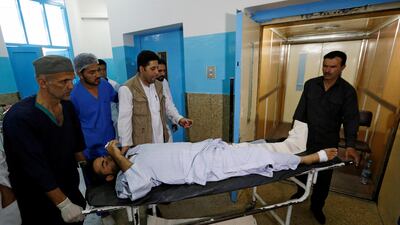A suicide blast claimed by the Taliban killed at least five people and several others injured in north Kabul on Tuesday in an attack that appeared to target Afghan soldiers collecting their salaries from a nearby bank.
It came four days after an attack on a Shiite mosque in west Kabul killed at least 28 worshippers. That attack was claimed by ISIL.
Tuesday's bomb went off outside a building housing several banks, including the privately-owned Kabul Bank which is used by the Afghan army to pay soldiers' salaries. The building is located less than 200 metres away from the US embassy.
"I live close to the site of explosion, and was at home when I heard several gunshots followed with the loud boom around 10am," local resident Sadia Tajali told The National.
“They were so loud and close that for a moment I thought the attack was taking place in my living room."
_______________
Read more:
ISIL lures jobless Afghans and Taliban with big salaries
Taliban suicide bomber kills seven in Afghanistan
Battlefield stalemate could prompt talks with the Taliban: Tillerson
_______________
Immediately after, warning alarms went off at the US embassy, she said, adding that she saw the Afghan security forces taking another suspect into custody.
“There was a lot of smoke coming from the banks — that’s when I started taking photos and noticed that the police were arresting another man."
Interior ministry Najib Danish said five people had been killed, including a guard, and eight civilians wounded.
Mohammad Salim Rasouli, chief of Kabul hospitals at the health ministry confirmed the death toll but said nine people had been wounded.
A Twitter account associated with Taliban spokesperson Zabihullah Mujahid claimed the attack, saying it had targeted troops collecting their salaries from Kabul Bank.
With the blast striking at the end of the month and two days ahead of Eid Al Adha, the building housing the banks was also crowded with civilians withdrawing their salaries.
It is not the first time the Taliban has targeted banks on payday or ahead of religious festivals.
Ahead of this year's Eid Al Fitr in June, the movement hit the Kabul Bank branch in Lashkargah, the capital of southern Helmand province, with a car bomb. At least 29 people died in that attack, most of them Afghan security forces, and 50 injured.
The same bank branch was targeted by militants in December 2014 while it was crowded with servicemen collecting their salaries. At least 10 people were killed.
Allah Gul Kamawal, a 32-year-old soldier who has been with the Afghan army since 2006, survived a similar attack that targeted a branch of Kabul Bank in the eastern city of Jalalabad in April 2015.
“Jalalabad looked like the city of the dead that day. A lot of innocent people were killed, civilians as well as police and army soldiers who were there to withdraw their salaries,” he said. “I survived but it’s not a scene I can ever forget.”
Mr Kamawal has served on many frontlines across the country, but admitted that he now avoids going to banks wherever possible.
“I avoid banks in big cities or regions with high threats. I’d rather borrow from friends and families than go risk my life for a few thousand Afghanis,” he said.
It would greatly help soldiers, he said, if Kabul Bank had in place mobile payment teams who could deliver salaries to account-holders in areas prone to attacks.
“If perhaps they could travel to vulnerable regions, maybe valuable lives of my brave colleagues wouldn’t be sacrificed while running bank errand,” he said.
The National was unable to reach a Kabul Bank representative for a comment on the high frequency of attacks targeting its branches.
The Afghan government said it recognised the pattern in attacks and has taken some measures to provide alternative means of payment to servicemen.
“We realise that the police and army are a sensitive target and many of our bases and police headquarters are equipped with bank branches, to help facilitate safer transactions,” said government spokesperson Javid Faisal, adding that the government may consider increasing the number of branches from which members of the security forces can withdraw their salaries.
“When the terrorists know they are losing in the battlefield, they spare no opportunity to attack civilians and our infrastructure; whether it’s school, banks, parks, roads, mosques — they are attempting trying to hit us everywhere,” he added.
“But we will persist."

